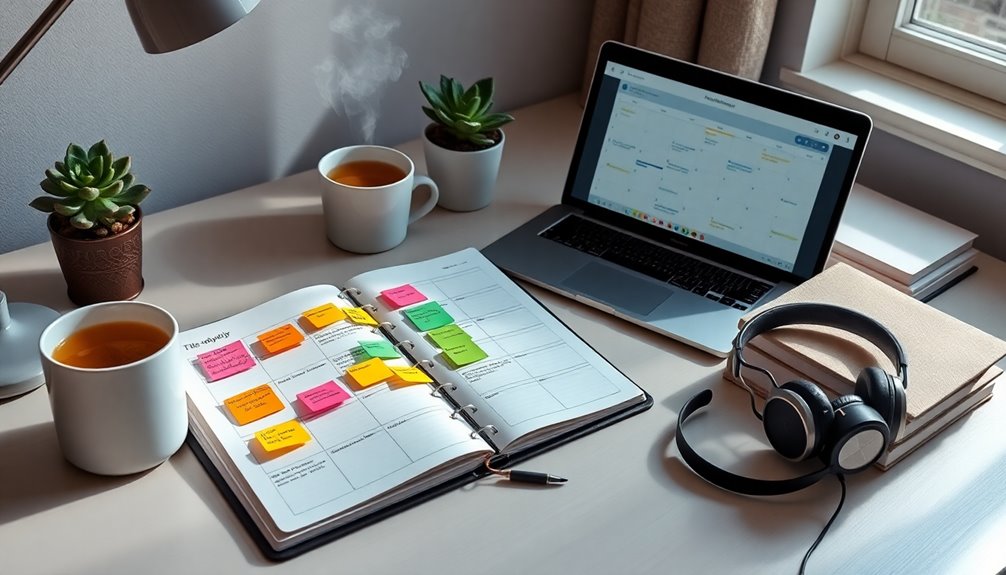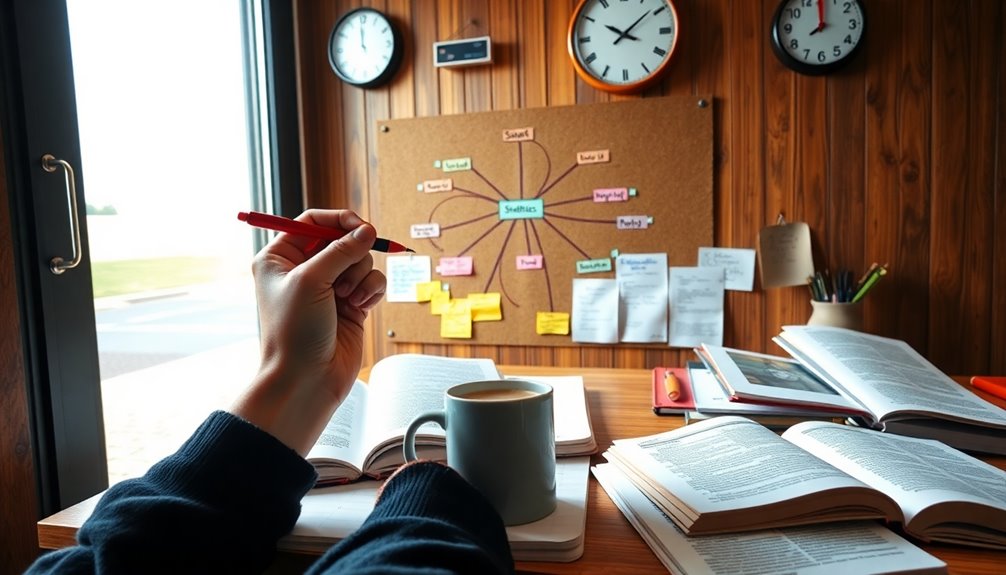To ace your statistics exams without stress, start by creating an exam-like environment and mastering time management. Focus on practice and repetition, tackling a variety of problems to reinforce key concepts. Joining a study group will boost motivation and deepen your understanding. Use memory enhancement techniques like active recall and spaced repetition to aid retention. Develop a study schedule with specific goals to keep you on track. Review your mistakes to identify areas for improvement and take advantage of digital resources for additional support. Stick around, and you'll uncover even more effective strategies to excel.
Key Takeaways
- Create a structured study schedule with S.M.A.R.T. goals to keep yourself organized and focused on specific tasks.
- Utilize practice exams and past questions to familiarize yourself with the format and identify weak areas for improvement.
- Engage in group study sessions to gain different perspectives and reinforce your understanding by explaining concepts to peers.
- Implement active recall and spaced repetition techniques to enhance memory retention and reinforce key statistics concepts.
- Simulate exam conditions by studying in a quiet space with a timer to build confidence and improve time management skills.
Create an Exam-Like Environment

Creating an exam-like environment is crucial for your preparation, as it helps you get accustomed to the actual testing conditions.
Choose a quiet, distraction-free space that resembles your exam room. Set up a desk with only the necessary materials, ensuring good lighting and comfortable seating to keep you focused. To replicate exam conditions, wear the same attire you'd choose for the test and avoid any electronic devices not allowed during it. Use a timer to simulate the exam duration, practicing under timed conditions to gauge your performance. Engaging in active studying through realistic study materials, such as past exams and practice questions, will reinforce your understanding.
This way, you'll feel more confident and ready when it's time for the real thing.
Master Time Management

Mastering time management is essential for success in statistics exams, especially when faced with multiple choice and free response sections. For multiple choice, aim for 2.25 minutes per question. Quickly scan the questions to tackle the easier ones first, and mark the tougher questions for later. Keep track of your time, ensuring you complete half by the 45-minute mark.
In free response, allocate 15 minutes for the first five questions and 30 minutes for the investigative task. Practice with past AP Statistics exams swiftly to prioritize effectively. Answer every part, and show your work to secure partial credit.
Create daily and weekly study schedules with S.M.A.R.T. goals, and guard against procrastination and distractions. This structured approach will enhance your exam performance.
Emphasize Practice and Repetition

After establishing effective time management strategies, it's time to emphasize practice and repetition to boost your performance in statistics exams.
Focus on tackling a variety of problems to cover all exam content, and identify your weak areas to concentrate your practice. Use problems from textbooks, online resources, and past exams to deepen your understanding. Incorporate regular review sessions to reinforce material and ensure you grasp the concepts thoroughly.
Create flashcards for key formulas and concepts, utilizing digital tools like Quizlet for efficient management. Incorporate spaced repetition to review these cards regularly, enhancing retention.
Engage in active retrieval by quizzing yourself and simulating exam conditions with practice tests. This approach not only reinforces your knowledge but also builds confidence, ensuring you're well-prepared come exam day.
Engage in Group Study

While studying solo can be effective, engaging in group study offers unique advantages that can significantly enhance your understanding of statistics.
Group study keeps you accountable, reducing procrastination and helping you stay on track. When you collaborate with peers, you gain different perspectives that deepen your analytical thinking. Additionally, the mutual motivation within the group helps prevent procrastination and encourages everyone to stay focused on their tasks. By incorporating audience engagement strategies, such as discussing real-world applications of statistics, you can further enrich your group study sessions.
Explaining concepts to others not only reinforces your understanding but also fills in gaps you might've missed. Sharing ideas cuts down the time spent puzzling over tough topics, and asking questions in a group fosters a supportive learning environment.
Plus, working together helps improve your communication skills and reduces test anxiety, making you more confident as you prepare for your exams.
Embrace the power of group study to boost your success!
Utilize Memory Enhancement Techniques

To excel in statistics exams, utilizing memory enhancement techniques can make a significant difference in how well you retain information.
Start with active recall: read your notes, close the book, and try to recall everything you've learned. Write it down, compare it to your notes, and correct any mistakes.
Employ spaced repetition by reviewing material at increasing intervals, using flashcards or apps to help. This method leverages the psychological spacing effect to reinforce your memory over time.
Break down complex concepts into smaller chunks, ideally four to seven items, and visualize them with mind maps.
Lastly, consider mnemonics like the memory palace technique or storytelling to link facts together.
These methods will enhance your memory capacity and boost your confidence when tackling those statistics exams.
Prioritize Self-Care and Routine

Prioritizing self-care and establishing a routine can significantly enhance your performance in statistics exams.
Start by ensuring you get 7-9 hours of quality sleep each night. Create a calming bedtime routine and avoid screens an hour before bed to improve rest.
Eating balanced meals with plenty of fruits, vegetables, and lean proteins fuels your brain and body, so don't skip meals—especially before exams. Staying hydrated is crucial too, as proper nutrition supports concentration and stamina during studies.
Incorporating physical activity, like jogging or yoga, can boost your mood and reduce stress, so schedule breaks for exercise.
Lastly, manage stress by practicing deep breathing or taking purposeful breaks to recharge.
These self-care habits help maintain your focus and energy, setting you up for success.
Develop a Study Schedule

Creating a study schedule is essential for effectively preparing for your statistics exams. Start by planning in advance; allocate specific time slots for each topic, breaking down the material into manageable chunks. Set realistic goals for each study session using your syllabus as a guide. Incorporating Law of Attraction principles can help maintain a positive mindset throughout your study process.
Create a structured routine by listing subjects and assigning daily or weekly study blocks. Make sure to include regular active studying sessions and be specific about the time spent on each task.
Distribute your study time effectively; focus on one or two concepts per session and use techniques like the Pomodoro method for concentration. Regularly review and adjust your schedule to stay on track and ensure you cover all key topics before the exam. Additionally, implementing time management techniques can further enhance your efficiency and effectiveness in studying.
Review Mistakes Thoroughly

After setting up a study schedule, reviewing mistakes thoroughly is a key part of mastering statistics. Start by identifying the specific errors in your work. Determine where you went wrong and analyze the differences between your incorrect solution and the correct one. Understanding why you made a mistake—whether due to a misunderstanding or miscalculation—helps prevent it from happening again.
Next, explain the correct concepts and steps needed to solve the problem accurately. Practice similar problems to reinforce your understanding and simulate exam conditions. Additionally, remember to show all work in your calculations to earn partial credit for correct reasoning.
Incorporate this review process into your routine, focusing on weak areas. Break down complex topics, use online resources for clarification, and keep your notes organized for easy reference. This approach will enhance your grasp of the material and boost your confidence.
Use Digital Study Resources

Digital study resources can significantly enhance your preparation for statistics exams. By utilizing official exam prep materials from providers like College Board, you'll gain access to thousands of practice questions, videos, and expert guidance. Taking full-length practice tests will help you become familiar with the exam format, reducing stress on test day.
Leverage platforms like Khan Academy for free, interactive materials that fit your learning style. You can practice with digital quizzes and exams to identify weak areas and improve your skills. Frequent errors are common in online applications and services, so it's important to ensure that the digital resources you use are reliable and well-maintained. Additionally, incorporating STEM toys into your study routine can help develop critical thinking skills that are beneficial for understanding statistics concepts.
Incorporating digital tools, such as graphing calculators, ensures you're prepared for data analysis tasks. Familiarizing yourself with these resources allows for flexible study sessions, making exam preparation more efficient and less overwhelming.
Stay Positive and Motivated

Staying positive and motivated is crucial for mastering statistics. Approach the subject with confidence; believe you can succeed. Remember, statistics is a learnable skill, and your efforts will pay off.
Embrace a growth mindset—view mistakes as opportunities for improvement. Enjoy the learning process, and you'll naturally achieve mastery. Engaging your subconscious mind during study sessions can enhance retention, similar to how Abraham Hicks emphasizes subconscious power during sleep.
Engage with statistics through intuitive analogies and real-world applications. Understand how scientists use statistics to make decisions and predict outcomes like final marks.
Participate actively in class, take comprehensive notes, and don't hesitate to ask questions. Utilize office hours for clarification, and write down your queries to revisit later. Maintaining a healthy work-life balance and prioritizing physical and mental health will enhance your focus and retention during your studies.
Frequently Asked Questions
How Do I Handle Exam Anxiety Effectively?
To handle exam anxiety effectively, you should practice deep breathing and meditation to calm your mind.
Engage in regular physical exercise to release tension and maintain a balanced diet.
Visualize a peaceful place to help reduce stress when you feel overwhelmed.
Remember to take breaks during your study sessions and get plenty of sleep before the exam.
Keep a positive mindset by reflecting on past successes and using positive self-talk to build your confidence.
What Are Some Healthy Snacks for Studying?
When you're studying, choosing healthy snacks can keep your energy and focus sharp.
Try veggies with hummus for fiber and healthy fats, or grab some Greek yogurt with berries for protein and brain-boosting antioxidants.
Avocado toast is another great option, providing complex carbs and Omega-3s.
Nuts or dark chocolate can satisfy cravings while offering healthy fats.
Keeping these snacks on hand will help you stay alert and engaged during your study sessions.
How Can I Improve My Concentration During Study Sessions?
To improve your concentration during study sessions, create a distraction-free environment. Keep your study area organized, turn off notifications, and place your phone out of reach.
Use the Pomodoro Technique—study for 25 minutes, then take a 5-minute break. Stay hydrated, eat healthy snacks, and ensure you're well-rested.
Engage actively with the material, taking handwritten notes and asking questions. Regular mindfulness practices can also help sharpen your focus and enhance retention.
What Should I Do if I Forget a Key Concept During the Exam?
If you forget a key concept during the exam, don't panic. Focus on the next question instead, and return to it later if time allows.
Use elimination strategies for multiple-choice questions to narrow down answers. Even if you can't recall the exact concept, show your work and reasoning; this can earn you partial credit.
Finally, remember to address questions you're confident about to maximize your score. Stay calm, and keep moving forward.
How Can I Balance Studying With Extracurricular Activities?
Balancing studying with extracurricular activities requires careful planning.
Start by creating a schedule that includes all your commitments, then prioritize tasks based on importance and deadlines. Allocate specific time blocks for studying and activities, ensuring you also set aside personal downtime.
Communicate with teachers about your workload and seek support when feeling overwhelmed. Regularly assess your commitments and adjust your schedule to maintain a manageable balance that allows you to thrive academically and personally.
Conclusion
By implementing these top study hacks, you're setting yourself up for success in your statistics exams. Creating a focused environment and mastering your time management will help reduce stress while you practice and engage with peers. Don't forget to utilize memory techniques, review your mistakes, and lean on digital resources to reinforce your understanding. Stay positive and stick to your study schedule, and you'll find yourself not just passing, but acing your exams with confidence!









